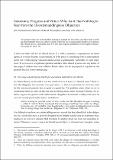Files in this item
Autonomy, progress and virtue : why Kant has nothing to fear from the overdemandingness objection
Item metadata
| dc.contributor.author | Timmermann, Jens | |
| dc.date.accessioned | 2018-04-10T11:30:08Z | |
| dc.date.available | 2018-04-10T11:30:08Z | |
| dc.date.issued | 2018-09 | |
| dc.identifier | 252772269 | |
| dc.identifier | 2026215e-1541-4273-8c54-9da5179222c7 | |
| dc.identifier | 85052056084 | |
| dc.identifier | 000442355600003 | |
| dc.identifier.citation | Timmermann , J 2018 , ' Autonomy, progress and virtue : why Kant has nothing to fear from the overdemandingness objection ' , Kantian Review , vol. 23 , no. 3 , pp. 379-397 . https://doi.org/10.1017/S1369415418000201 | en |
| dc.identifier.issn | 1369-4154 | |
| dc.identifier.other | ORCID: /0000-0003-4155-3288/work/69463315 | |
| dc.identifier.uri | https://hdl.handle.net/10023/13105 | |
| dc.description.abstract | Is Kant’s ethical theory too demanding? Do its commands ask too much of us, either by calling for self-sacrifice on particular occasions, or by pervading our lives to the extent that there is no room for permissible action? In this article, I argue that Kant’s ethics is very demanding, but not excessively so. The notion of ‘latitude’ (the idea that wide duty admits of ‘exceptions’) does not help. But we need to bear in mind (i) that moral laws are self-imposed and cannot be externally enforced; (ii) that ‘right action’ is not a category of Kantian ethics – there is a more and a less, and lack of perfection does not entail vice; and (iii) that only practice makes perfect, i.e. how much virtue can realistically be expected can vary from agent to agent. The principle that ‘ought’ is limited by ‘can’ is firmly entrenched in Kant’s ethical thought. | |
| dc.format.extent | 19 | |
| dc.format.extent | 253552 | |
| dc.language.iso | eng | |
| dc.relation.ispartof | Kantian Review | en |
| dc.subject | Demandingness | en |
| dc.subject | Autonomy | en |
| dc.subject | Latitude | en |
| dc.subject | Moral progress | en |
| dc.subject | B Philosophy. Psychology. Religion | en |
| dc.subject | T-NDAS | en |
| dc.subject | BDC | en |
| dc.subject | R2C | en |
| dc.subject.lcc | B | en |
| dc.title | Autonomy, progress and virtue : why Kant has nothing to fear from the overdemandingness objection | en |
| dc.type | Journal article | en |
| dc.contributor.institution | University of St Andrews. Philosophy | en |
| dc.contributor.institution | University of St Andrews. Centre for Global Law and Governance | en |
| dc.identifier.doi | https://doi.org/10.1017/S1369415418000201 | |
| dc.description.status | Peer reviewed | en |
This item appears in the following Collection(s)
Items in the St Andrews Research Repository are protected by copyright, with all rights reserved, unless otherwise indicated.

